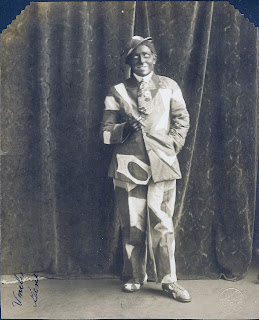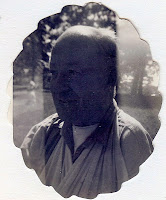Francis Eugene McGinnis (1891 – 1961)
Because both Irish immigrants and Irish-American were, in general, looked on with disdain during the late 19th century and even into the early 20th century, many are said to have taken to appearing in vaudeville as a way of gaining recognition and respect.
It is said that by appearing in blackface, Irish performers “hid” their identity and “became” part of the society and culture that otherwise had no use for them.
 |
| Francis Eugene McGinnis, aka “Gene Sheebo” |
My grand-uncle, Francis Eugene McGinnis, who was known to family and friends by his middle name, Gene, was one of those who dabbled in this form of vaudeville. Blackface had been popular for nearly 80 years by the time Gene McGinnis adopted the comic persona of “Gene Sheebo,” singing and performing in various venues in Chicago and the Midwest. (Blackface would die out in the 1950s with the advent of the civil rights movement.)
Unlike his older sister, Benita, and his younger brother, John, who had dark hair, Gene and his younger sister (my maternal grandmother), Alice, had bright red hair and freckles that sometimes made them the targets of relentless teasing by their peers. Perhaps because of the paralysis on his left side and the back and leg pain he suffered as a result of a childhood bout with scarlet fever, Gene also encountered difficulty finding suitable employment. It should be no surprise, then, that he might have found some comfort in the control he must have felt as he applied burnt cork to his face and hair before going onstage to perform in front of an audience as someone very different, comical and seemingly carefree.
His stint as a vaudevillian did not last past a couple of years. Afterward, Gene became “Brother Francis Eugene” during a short career as a Trappist monk in Kentucky. His draft registration cards for World Wars I and II show him later on as a salesman for the National Refining Company in Chicago and then as a senior clerk for the Works Project Administration (WPA).
 |
| My Uncle Gene performing in vaudeville. Photo by Walinger Studio, Chicago, Illinois |
Gene McGinnis never married. He was a loving uncle to his nieces and nephews, however, and he doted on my mother, Joan Schiavon, often bringing her candy and telling her magical stories.
My mother, Joan (Schiavon) Huesca, worshipped Uncle Gene. She often waited at the living room window, watching for his arrival and the wonderful sweets he would bring, always packaged in a white box tied up with a bow, from him, her “beau.” She would sit at his feet as the family listened to the radio in the evenings and tried to mimic him as he told jokes and sang songs. Once, her cousin, Jack McGinnis (son of Gene’s brother, John), who was a few years older than my mother, asked her if she would marry him when she grew up. My mother, who could not have been more than about five or six at the time, replied right away that she would, but added that she would have to marry Uncle Gene, too, because that way he would always bring candy.
 |
| Uncle Gene – with a broken arm? Chicago, circa 1950. |
Cousin Jack shook his head gravely. “You can’t do that, Joan, because it would be bigamy,” he said. My innocent mother replied, “well, it may be big of you, but it’ll be just as big of Uncle Gene, too!”
As Gene aged, his aches and pains worsened, and he tried in vain to relieve his constant discomfort with medication and, eventually, alcohol. Shortly after my mother and father married, Uncle Gene’s health deteriorated, and he went to live with them for a couple of years at their apartment on the south side of Chicago. He became ill in late January of 1961 and entered Cook County Hospital, where he died of a heart attack on February 3, 1961. He was 69 years old. He is buried at Holy Sepulchre Catholic Cemetery in Chicago, Illinois, next to his parents.
Some might say that Francis Eugene McGinnis led a sad life. Though there may be some truth to this, he was also a man of strength and determination who strived in the best way he knew to overcome daunting obstacles with grace, humor, and courage. And because of that, we, his family, will never forget him as the Great Uncle Gene.
Copyright © 2012 Linda Huesca Tully
Sometimes the saddest people make the funniest comedians.
What a thoughtful remembrance you have written of him.
Very moving tribute to your grand-uncle. He sounds like he was a very loving and loved gentleman.